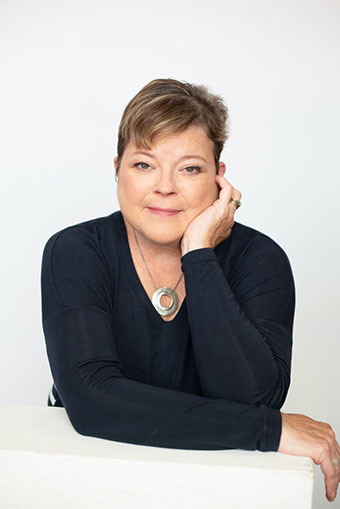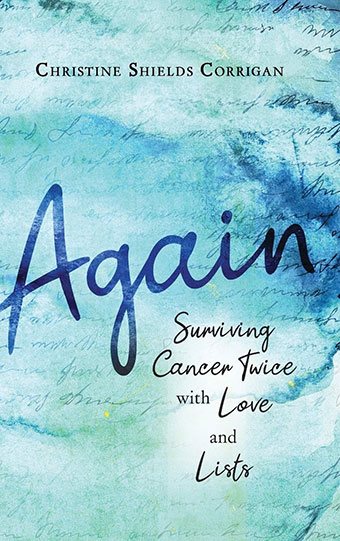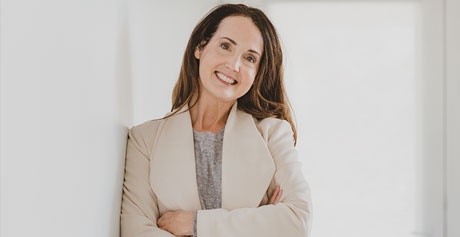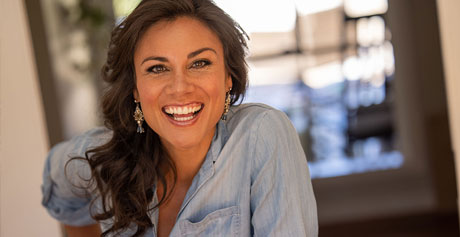An Exclusive Interview With Author, Christine Shields Corrigan
 She Shares Her Personal Journey Confronting Her Oldest Fears Of Illness, Death & Losing Control As She Struggles To Survive Her Second Encounter With The Dreaded Beast.
She Shares Her Personal Journey Confronting Her Oldest Fears Of Illness, Death & Losing Control As She Struggles To Survive Her Second Encounter With The Dreaded Beast.
Q: What prompted you to write Again?
CSC: I wrote Again for several reasons, both external and internal. The easiest external reason is that I wrote Again because my surgical nurse navigator asked me to write a “list” of helpful tips or tricks I learned going through breast cancer treatment that she could share with other patients. She really wanted a list. But, once I started writing, I couldn’t stop and three months later I had more than a list. I had ten essays for her. Those essays became the starting point for Again.
Another reason I wrote Again is when I was first diagnosed, I searched for a book that would serve as a trail map, so to speak, to help guide me through the experience. In my search, I found plenty of books written by medical professionals about cancer, its diagnosis, and treatment. I found celebrity cancer narratives. I found beautiful memoirs about the meaning of life written by individuals who died—from cancer. I found plenty of pink, inspirational guidebooks and journals. I didn’t find those books helpful. So, I decided to write my own in the hope that when other individuals hear: “I’m sorry, you have cancer,” some of my experiences may resonate and help them.
The more complex, internal answer is that I knew I would never heal emotionally and psychologically if I didn’t write it. When I was a teen, I didn’t speak about my feelings or fears. My pathological ability to compartmentalize, organize, and avoid worked well for thirty-five years. Then it didn’t. My systems crashed, burned, and shattered many of those whom I hold most precious. This book gave me the grace to let go of old hurts and fears and to forgive.
In the process of writing Again, I also found I wanted to debunk some common misunderstandings about cancer, its treatment, and life after cancer. In particular, I wanted to share my long road back to sexual well being, a topic that’s been taboo for too long, and make clear that cancer never really ends. Patients and survivors must live with lingering and latent uncertainty for the rest of their lives. Yet, having confronted my mortality, I better appreciate the beauty and grace in our most ordinary moments—a hummingbird hovering over a plant in my garden, the delicious warmth of the first sip of coffee in the morning, the scent of a summer thunderstorm, or even folding laundry or chopping an onion. I also like to think, though my family might say otherwise, that I’m better able to let go of many of life’s annoyances. I try not to sweat the small stuff and to be fearlessly decisive about important matters.
Finally, this book gave me the courage to step out of my planned and ordered life and to begin a practice that’s led me to peaceful coexistence with life’s awe and agony. And perhaps, this book will help to light a path forward, as so many did for me.
Q: You trained as a lawyer and came to writing as a second career. How did you make that jump?
CSC: It wasn’t as huge a jump as you might think. As a labor and employment attorney, I wrote a great deal—memos, position statements, briefs, deposition outlines, and jury charges—over my years of active practice. When I stopped practicing law in 2004 after my family moved to New Jersey, I started my own legal writing business primarily to craft marketing materials for law firms, such as articles, seminar materials, newsletters, and web content about developments in labor and employment law. I had a good writing routine worked out by then where I blocked 9:30 to 2:30 everyday to write while my kids were in school. I did that for about twelve years, and then breast cancer happened.
After I went through treatment, I had to ask myself the hard questions about what I wanted to do. Did I want to go back to writing about employment law or even return to practice or did I want to do something else? I chose the latter, but I didn’t simply sit down and start writing a book. I acted like a lawyer. I did research. I spoke to other authors and individuals I know who work in publishing. I took writing classes, specifically memoir and creative non-fiction classes. I worked with other writers and learned how to write essays and how to pitch them. I attended writing workshops and conferences. I went to author talks. I read craft books and lots of memoir. I joined a writing group. I wrote drafts and rewrote them. I learned how to edit hard and dump what didn’t work.
It’s been quite a process, but as an attorney, I didn’t know how to examine a witness, take a deposition, or appear at hearing when I walked out of law school. It took me years to learn how to do those things well. Writing is no different. To do it well, you have to do it every day, even when it’s hard, even when the words don’t come, and even if the whole day’s work ends up in the bin. Then, you start again. When writers in my workshops ask me how to write, I suggest that they make writing a daily practice, similar to any of practice, such as exercise, yoga or meditation. But, like any discipline, it’s not easy to do.
Writing takes so much courage and strength to handle a lot of rejection. So, you have to want with your whole heart and mind, to the point of being driven, to tell the story that’s living inside of you. Otherwise, you won’t work on it. You won’t get up early, go to bed late, or stay inside on a beautiful day to get the words down. Along with writing, you have to read and read broadly. Most writers usually are avid readers; honestly, I don’t think you could be a writer without being a deep reader first.
Q: What scene was the hardest to write?
CSC: Writing about how badly I messed up telling my children about my breast cancer diagnosis, particularly my daughter, was one of the hardest to write. I had to confront a lot of demons about my past in those pages and how I ended up doing many of the same things my parents did—limiting information in order to “protect” my children. When my parents did this to me as a kid or even as a young adult, I would get so angry, and I swore that I’d never do anything of the sort to my children. That joke was on me. I caused my daughter, in particular, a great deal of pain and hurt. It’s something I’ll always regret doing.
Q: What was the best piece of writing advice that you received?
CSC: The best piece of writing advice I’ve ever received came from Allison K Williams. It was: “Every villain is the hero is her own story.” The moment I heard those words, they changed the way I looked at character development. I finally understood the need to consider alternate points of view, something I’d been taught, but didn’t fully get. This advice allowed me to be more empathetic and forgiving toward my parents as I wrote. Being a parent myself now, I could better appreciate the choices they made when I was a teenager with Hodgkin’s lymphoma and not demonize them as I had in my head and in early drafts.
Q: Do you listen to podcasts and if so, what is your favorite?
CSC: Yes, I do listen to podcasts. My kids got me turned on to them. In August, I drove with my nineteen-year-old son from New Jersey to the University of Wyoming in Laramie and listened to many, many episodes of The Last Podcast on the Left. I enjoy listening to Everything Happens with Kate Bowler and On Being with Krista Tippett. My favorite podcast is The Reading Women with Kendra Winchester, which features books by and about women. Kendra and her contributors do an amazing job with their author interviews and book picks, and I get many of my reads from this podcast.
Q: What’s one lesson you’ve learned in your career that you can share with our audience?
CSC: For many years, I had a pewter box with the engraving: “What would you attempt to do if you knew you could not fail?” on the lid. I kept that box on my desk through my years of practicing law and then later when I ran my own legal writing/marketing business. Recently, I gave it to my older son to remind him not to be afraid of taking chances or failing.

Life is a long highway, and I never imagined at age 54 that I’d be publishing a book. When I graduated college in 1988, I had a plan: go to law school, get married, have a career, have children, and retire someday. While I’ve done many of those things, plans change. I often remind my children—two of whom are grown and flown and my third is in high school—to remember that nothing is fixed or permanent. If they don’t like the path they’re on or the job they’re in or the major they’ve chosen, it’s okay to change.
We’re so afraid of change and the unknown and of falling gloriously on our faces. Yet, I’ve found that, it’s in those moments or experiences where I’ve learned the most and grown the most, even when those experiences are hard, scary, and ego-bruising. Live fearlessly. What would you do if you knew you could not fail?
Q: Which woman inspires you and why?
CSC: Many women throughout history have inspired me over the years. However, since I have to choose one, US Supreme Court Justice Ruth Bader Ginsburg continues to inspire me with her fierce intellect, personal strength and resilience, and her advocacy for women’s rights throughout her career. She co-founded the Women’s Rights Project at the American Civil Liberties Union, litigated in favor of women’s rights, and staunchly supported them from the bench of the Supreme Court.
Justice Ginsburg’s support for women’s rights isn’t surprising given the discrimination she faced in law school and in her career. According to the ACLU, Ginsburg was one of nine female students admitted to Harvard Law School in 1956, and the Dean took them to task for occupying seats that should have gone to men. Though she graduated tied for first in her class and was recommended for a clerkship with Supreme Court Justice Felix Frankfurter, she didn’t get it because Justice Frankfurter wasn't ready to hire a woman. While she applied for job after job at New York law firms, she wasn’t hired as an attorney. When she was a professor at Rutgers University and discovered that her salary was lower than her male colleagues, she joined an equal pay campaign that resulted in pay increases for all of the women who complained. Her dissent in Ledbetter v. Goodyear Tire & Rubber Co., a pay discrimination case which restricted the time period for filing such complaints, ultimately resulted in the passage of the Lilly Ledbetter Fair Pay Act of 2009, the first piece of legislation signed by President Obama. That law confirms that each paycheck containing discriminatory compensation is a separate violation regardless of when the discrimination began.
Justice Ginsburg’s opinions are analytical and calculated. She doesn’t advocate for sweeping societal change from the courts; rather, she responds one step at time to the individual issues before her. I appreciate that precision and commitment to the separation of powers within our constitutional framework. I also appreciate how she dealt with own health and personal challenges and still showed up for oral arguments. She is, according to Oyez.org, a “force to be reckoned with,” and I can’t think of a higher compliment.
Q: What are some of the challenges you feel women face today?
CSC: Wow. All of them. The outbreak of the COVID-19 pandemic has laid bare the inequity faced by women at many levels—from the workforce to the home. For example, from February to April 2020, women lost 12.1 million jobs, and as the economy began to recover in June, only regained one in three of those jobs, according to the National Woman’s Law Center, with Black women and Latinas suffering the greatest job losses. Further, even those who have returned to work, many women aren’t working the same number of hours that they previously did. Younger women (age 20 and over) also have a higher rate of unemployment than their male counterparts. This pandemic is undermining women’s ability to sustain themselves economically.
In addition, in working families with school-aged children, women largely shoulder their new roles as homeschool teacher, Zoom tech support desk, and Google Classroom aide, in addition to whatever their paid job demands. The COVID-19 economy s is crushing the children and their parents and caregivers emotionally and psychologically. That’s not to suggest that individuals who don’t have children aren’t suffering. They’re experiencing loneliness and isolation from friends, family, and their colleagues too.
Q: What is one word of advice you can offer to young women who want to reach your level of success?
CSC: Success is defined as a “favorable or desired outcome.” The first thing that you need to do is define your success—what outcome is being sought. And those outcomes are as wonderfully varied as we are. Maybe, your goal is to be the CEO of a major corporation or a partner in a law firm; maybe you want to bake the best chocolate chip cookie ever; or maybe your goal is to have your art hang in a gallery or museum someday. Whatever that outcome or goal is, it must make you want to get out of bed every morning and work toward it.
It’s often said that we should follow our “passion.” The expression has never resonated with me. I think of passion of something that burns hot, then fades. That’s not what success demands. Success needs devotion, I think, like a slow-burning fuel, to put in the mental and physical energy to achieve the goal, especially when it seems so distant, so unattainable, so damn hard to achieve.
Finally, and most importantly, success changes, as life changes, and if you don’t achieve one measure of success—maybe you figure out you hate chocolate chip cookies—you can start again.
Q: What’s one of the toughest decisions you’ve had to make and how did it impact your life?
CSC: I’ve had to make a lot of hard decisions, but the hardest was giving up practicing law. At the time, I’d invested fifteen years in my practice. I enjoyed the law’s challenges. Then, my husband was transferred across the country, and we learned shortly thereafter that our older son had significant learning differences. I gave up being a full-time lawyer and became his advocate instead. Today, he’s in college and doing well in his classes and living independently. I don’t regret that decision at all.
Five Things About Christine Shields Corrigan
1. If you could talk to one famous person past or present, who would it be and why?
“Though the sex to which I belong is considered weak, you will nevertheless find me a rock that bends to no wind.” –Queen Elizabeth I.
If I could talk to one famous person, it would have to be Elizabeth I who was the Queen of England from 1558 to 1603, a period of time known as the Elizabethan Age, when England became a major European power. Elizabeth used her authority to make decisions and set policy during a period when most women had no power. I would love to hear how she did it.
2. Favorite dessert?
So many choices! Lemon bars or pumpkin pie? Carrot cake or macarons? Love them all, but my favorite dessert is made sweeter because I only have it once a year. That’s the sweet cream and walnut ice cream from Sundae School in Harwich Port, MA. This ice cream perfectly balances the sweetened cream, not vanilla, flavor against the crunchy, slightly bitter walnuts. It’s all of life in ice cream, and I willingly drive the five plus hours from NJ to MA to have it every summer.
3. Who would you want to play you in a movie of your life?
Elizabeth McGovern, hands down. She has such grace and presence on the screen. She was my boon companion as Cora Crawley on Downton Abbey, which I spent hours watching while I received chemotherapy for breast cancer.
4. What would you sing at Karaoke night?
Nothing. I have the worst singing voice. Of course, that doesn’t stop me from singing along to my favorite songs when I drive, much to the chagrin of anyone who might in the car with me. If someone forced the mike into my hand, I’d probably choose something by Stevie Nicks, like Stop Dragging My Heart Around or Nightbird, since I’ve been fangirling over her since I was fifteen.
5. How would your friends describe you?
I have awesome friends. They would describe me as no nonsense person—I tell it like I see it, analytical, confident, a dry wit, fiercely loyal, a good mom, supportive of women, faith-filled, and compassionate.

